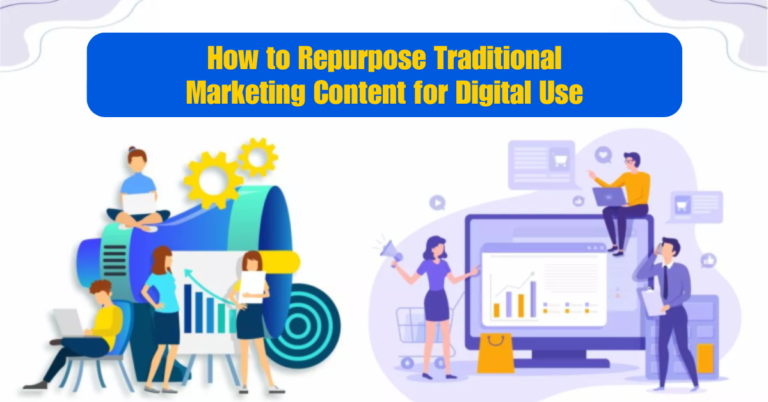In the fast-paced digital age, marketing strategies have shifted to prioritize online channels. Yet, many businesses have a treasure trove of traditional marketing content—brochures, print ads, direct mail pieces, and more—that can still provide value. Repurposing these materials for digital platforms not only saves time and resources but also extends the reach and effectiveness of past efforts.
For businesses, including any digital marketing agency in Chennai, adapting traditional content to suit modern digital demands is a strategic way to bridge the gap between the old and the new. Here’s a step-by-step guide on how to repurpose traditional marketing content for digital use effectively.
Why Repurpose Traditional Marketing Content?
Before diving into the how, let’s explore the benefits:
- Cost Efficiency: Creating new content from scratch requires time, effort, and money. Repurposing maximizes the value of existing assets.
- Brand Consistency: Using familiar materials helps maintain brand identity across both traditional and digital channels.
- Content Diversity: Traditional content often contains rich information that can be reformatted into diverse digital formats, reaching wider audiences.
By leveraging existing materials, businesses can create a cohesive message that resonates across platforms.
Steps to Repurpose Traditional Marketing Content
1. Audit Your Existing Content
Start by reviewing all traditional marketing materials, including print ads, brochures, flyers, and whitepapers. Identify pieces that remain relevant and valuable to your target audience. Consider content that highlights your brand’s story, unique selling points, or customer success stories.
For example, a printed case study showcasing client success could be transformed into a visually appealing social media post or a blog article.
2. Adapt for Online Formats
Digital platforms demand a different approach than traditional media. To repurpose effectively, adapt content to suit the characteristics of each platform:
- Brochures and Flyers: Convert these into downloadable PDFs for your website or use them as the basis for blog content.
- Direct Mail: Reformat compelling headlines or calls to action into email marketing campaigns.
- Print Ads: Update these with interactive elements, such as clickable links or QR codes, to use in online display ads.
A digital marketing agency can help refine this process, ensuring the adapted content aligns with best practices for each platform.
3. Leverage Visual Content
Traditional marketing often involves visuals like photos, charts, and graphics. These can be repurposed for digital use, such as:
- Creating infographics from data-heavy brochures.
- Sharing high-quality images from print campaigns on Instagram or Facebook.
- Using old promotional videos for YouTube or website landing pages.
Ensure visuals are optimized for web use by resizing and compressing files to maintain fast loading times.
4. Transform Long-Form Content
Long-form content like whitepapers, reports, or presentations can be broken down into smaller, shareable pieces:
- Create a blog series from a detailed report.
- Highlight key points in an engaging LinkedIn post.
- Extract quotes or statistics to use in social media graphics.
Repurposing in this way ensures your audience can consume the information in bite-sized, easily digestible formats.
5. Add Interactivity
Digital platforms offer unique opportunities to engage users. Enhance repurposed content by adding interactive elements:
- Include clickable links in PDFs and eBooks.
- Turn direct mail offers into interactive email campaigns with embedded videos.
- Transform static slides from presentations into dynamic webinars or tutorials.
Interactivity increases engagement and makes content more memorable for your audience.
6. Update Messaging for Modern Relevance
While traditional content may have been effective in its time, messaging and tone need updates to resonate with today’s digital audience. Revisit:
- Language: Simplify formal text for a conversational tone.
- Keywords: Incorporate SEO-friendly terms for better visibility in search engines.
- Visuals: Update logos, images, or branding elements to reflect current trends.
A SEO company in Chennai can provide guidance on updating content to align with contemporary audience expectations.
7. Distribute Strategically
Once repurposed, ensure your content reaches the right audience by selecting appropriate digital channels:
- Social Media: Share bite-sized content, visuals, and updates.
- Email Marketing: Use newsletters to distribute revamped brochures or announcements.
- Website: Create landing pages for downloadable content, such as reports or guides.
- Paid Ads: Use snippets from print ads in PPC campaigns on Google or social platforms.
Examples of Repurposing Success
1. Transforming Print Ads into Social Campaigns
A business that once relied on magazine ads can extract key visuals and taglines to craft Instagram carousel posts, reaching a broader audience.
2. From Brochure to Blog
A company brochure detailing product benefits can be expanded into multiple blog posts, each diving deeper into specific features or customer stories.
3. Turning Presentations into Webinars
A sales presentation used at trade shows can be reimagined as a live webinar, providing value to online attendees and generating leads.
Transforming traditional marketing content for digital platforms is a smart, cost-effective method to refresh your marketing strategy while preserving brand identity. By thoroughly reviewing existing materials, you can identify valuable assets that resonate with your target audience. These materials can then be adapted into engaging digital formats, such as social media posts, email campaigns, infographics, or blog articles, ensuring they align with current trends and platform-specific requirements.
Once repurposed, strategic distribution across digital channels maximizes visibility and impact, allowing businesses to reach broader audiences. This approach not only extends the utility of previous marketing efforts but also ensures your brand stays relevant, agile, and connected in an increasingly digital world.
For companies seeking guidance, partnering with a digital marketing agency ensures a seamless transition from traditional to digital, unlocking the full potential of your content to drive engagement and growth. In the ever-evolving marketing landscape, repurposing isn’t just practical—it’s essential.
